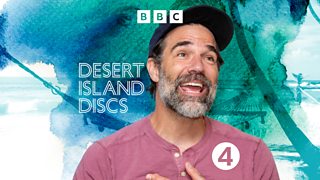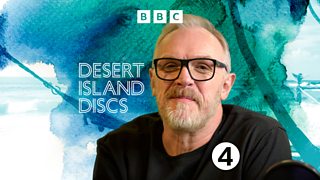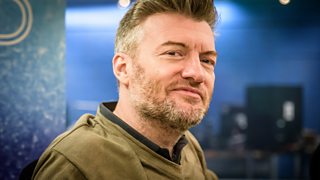Seven things we learned from Rob Delaney’s Desert Island Discs
Rob Delaney is a comedian, writer and actor, who is best known for the dark comedy series Catastrophe, which he co-wrote and co-starred in alongside Sharon Horgan. The series, which ran from 2015 to 2019, was broadcast on Channel 4 and won the pair a BAFTA and a Royal Television Society Award for comedy writing. In 2022 Rob wrote his best-selling book A Heart That Works about the death of his two-and-a-half-year-old son Henry from a brain tumour, and the impact of loss and grief on his family. Rob has recently starred in Hollywood blockbusters like Deadpool and Mission Impossible.
Here are seven things we learned from Rob’s Desert Island Discs…
-

Listen to Rob Delaney's Desert Island Discs
Listen on BBC Sounds to hear the episode with full music tracks first.
1. He often writes about what he knows best – himself

“I do sometimes wish that I would, just for once, think of something to write that was about some weird herb farmer on a moon of Jupiter that communicates with clicks and beeps and has nothing to do with my own life. It just doesn't shake out like that. Maybe one day I'll learn.”
2. He gets his sense of humour from his mum
“I can remember one time coming home with my sister when we were quite young. We go into the room where my mum is reading a newspaper, and we say ‘Mummy, Mum’ and she takes down the newspaper and she's wearing an unbelievably high quality [Halloween] mask of an old man, bald and wrinkled with a big black beard. So, my sister and I give blood-curdling screams and jump into each other's [arms]. We're hovering and hugging in the sky above her, and that's her idea of fun!”
3. A broken-down bus is the reason he got into comedy
Rob studied musical theatre at New York University and his first job was playing Sir Lancelot in a national tour of the musical Camelot by Frederick Loewe and Alan Jay Lerner. On one occasion the tour bus broke down and the cast arrived late to the venue. Rob picks up the story…
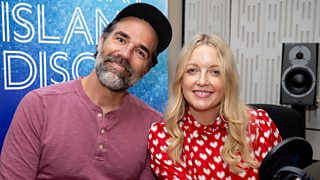
And to me, that is romantic. When you, again and again day in and day out, make the decision to make it [the marriage] work. That's very special.Rob on writing the hit TV show Catastrophe
“We got there 20-minutes after we were supposed to start. So an audience of 2500 people is [sitting] in the theatre in West Virginia and we have to do a sound check. Soundcheck consists of singing a few bars of one of your songs, and then a few lines of dialogue but I don’t want to spoil [the plot], as if these people didn't already know Camelot. So I spoke a little bit about our day, [that we] broke down by a river in Virginia and people laughed. And I was like, ‘What? What is this?’ And so from that moment forward, it was just all comedy, all the time.”
4. The aim of Catastrophe was to show what a real marriage looks like
“[Sharon Horgan and I] both had had enough of sitcoms where the husband was an oaf and the wife was overburdened and shrill and that just didn't ring true for us. What seemed to be far more true was vacillating between being head over heels in love with your spouse and thinking, ‘How did I ever land this person? What a transcendental joy. What is this gift that I've been given?’ to 20 minutes later being like, ‘I'm going to kill them…’ Why? Because they were rude to me about my socks!”
The couple also wanted to acknowledge that marriage takes a lot of day-to-day commitment from both parties. Rob says, “We wanted to show the blue-collar work ethic that's necessary to have a marriage endure. You’ve got to roll your sleeves up. You're going to have weird little burns on your arm shooting out of the forge as you hammer the new tool, you need to make it work. And to me, that is romantic. When you, again and again day in and day out, make the decision to make it [the marriage] work. That's very special.”
Rob met his wife when they were both volunteering at a summer camp for people with disabilities. They have been married for 18 years.
5. Steely Dan is helping him prepare for his impending mid-life crisis
“I'm 47, so I'm beginning to think about what sort of mid-life crisis I want to have. And since I don't drink or do drugs and since I love my wife and want to continue to live with her in my house with my family, I have to have a lower grade one. I'm thinking it might be something like joining a Steely Dan cover band. I’d heard [Steely Dan] on the radio and I thought, ‘Yes, I enjoy these.’ But when I heard [the track] Fire in the Hole, I was like, ‘I need to know more’ [about the band]. So I just started real forensic listening of them and with Fire in the Hole, that's when it clicked.”
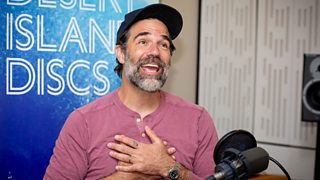
I looked at him and just started weeping and was so in love with him and just wanted to sniff him and eat him and put him under my shirt and squeeze him.Rob on the birth of his fourth son.
Fire in the Hole is Rob’s sixth disc and appears on Steely Dan’s debut album Can’t Buy a Thrill which was released in 1972.
6. A new baby brought happiness into Rob’s life after the loss of his son
Rob’s two-and-a-half-year-old son Henry died from a brain tumour in 2018. At the time of his death Rob’s wife was expecting their fourth child – a son – who was born later that year. Rob admits that he had complicated feelings just before his son’s birth.
“I was [thinking] well, my heart’s been destroyed. It's been torn into pieces and dissolved in salt, and it's just garbage so I'll take care of this kid. I will feed him. I will put him in clothing that fits but am I going to be able to love him? I don't know if I can do that anymore. And then the nanosecond he exited my wife’s body. I looked at him and just started weeping and was so in love with him and just wanted to sniff him and eat him and put him under my shirt and squeeze him. And I love him desperately.”
7. The older he gets the more patient he is with his creative endeavours
“I'm less prideful now. Now I'm very happy to write a terrible first draft and I think that's a big one that separates the big dogs from the pups on the porch, because the pups on the porch are afraid to write a bad first draft. They write a first draft that they don't like and they're like, ‘Oh, no, I'll just stop.’ Big Dog says, ‘Yeah, look at that. That's terrible. I'm gonna keep on going, you know.’ And so for me, the measure of a successful day is how uninterrupted was the clickety clack of the keyboard, absolutely not the quality of what was written.”
